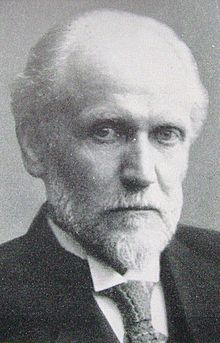
Back غوستاف كاسل Arabic جوستاف كاسل ARZ Gustav Cassel German Gustav Cassel Spanish گوستاو کسل Persian Gustav Cassel French Karl Gustav Cassel Hungarian Gustav Cassel ID Gustav Cassel Icelandic Gustav Cassel Italian
Gustav Cassel | |
|---|---|
 | |
| Born | 20 October 1866 |
| Died | 14 January 1945 (aged 78) |
| Nationality | Swedish |
| Academic career | |
| Institution | Stockholm University |
| Field | Mathematical economics |
| School or tradition | Stockholm School |
| Alma mater | Uppsala University |
| Doctoral advisor | Gösta Mittag-Leffler |
| Doctoral students | Gunnar Myrdal Bertil Ohlin Eli Heckscher Gösta Bagge |
| Influences | Léon Walras |
| Contributions | Purchasing power parity, work on interest |
Karl Gustav Cassel (20 October 1866 – 14 January 1945) was a Swedish economist and professor of economics at Stockholm University. Cassel was among the most prominent economists in the world in the interwar period.[1] He made contributions to the study of value, monetary policy, and business cycles.[2]
Cassel was influential in Swedish debates about central planning in the early 20th century.[1] Prior to World War I, Cassel held classical liberal views but shifted towards conservative liberalism in the interwar period.[1] Cassel was a leading critic of socialism[2] and state intervention in the economy.[3]
- ^ a b c Carlson, Benny (2018). Swedish Economists in the 1930s Debate on Economic Planning. Springer. pp. 33–35. doi:10.1007/978-3-030-03700-0. ISBN 978-3-030-03699-7.
- ^ a b Ellis, Howard S. (1945). "Gustav Cassel 1866-1945". The American Economic Review. 35 (3): 508–510. ISSN 0002-8282.
- ^ Carlson, Benny; Jonung, Lars (2024), Tooze, Adam; Corsetti, Giancarlo; Obstfeld, Maurice; Clavin, Patricia (eds.), ""Too Bad to Be True": Swedish Economists on Keynes's The Economic Consequences of the Peace and German Reparations, 1919–29", Keynes's Economic Consequences of the Peace after 100 Years: Polemics and Policy, Cambridge University Press, pp. 99–129, doi:10.1017/9781009407540.006, ISBN 978-1-009-40755-7
© MMXXIII Rich X Search. We shall prevail. All rights reserved. Rich X Search